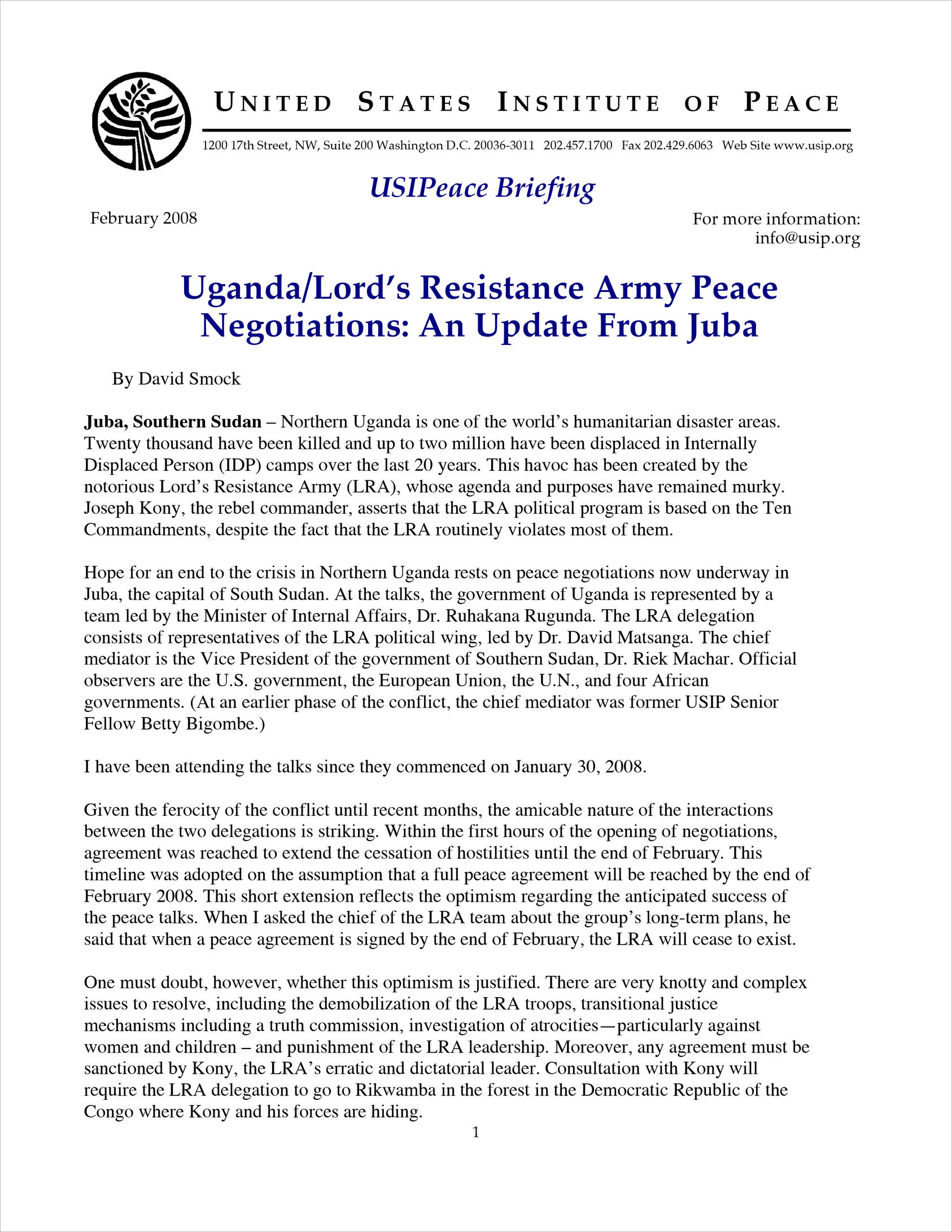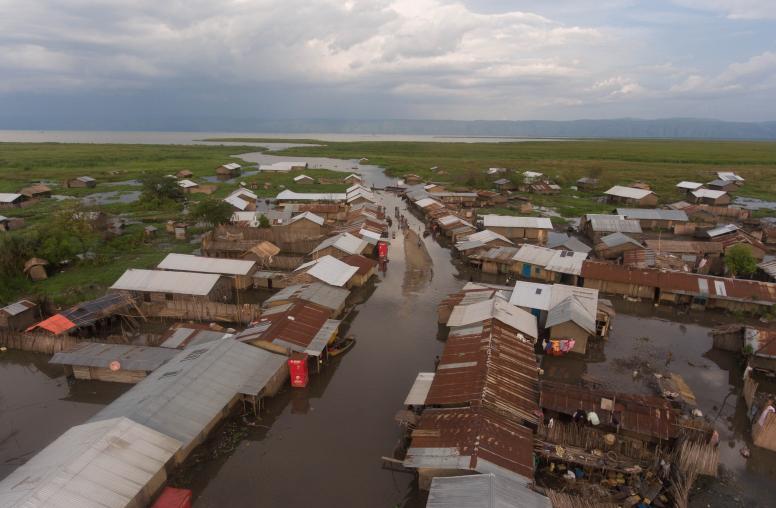Uganda/Lord's Resistance Army Peace Negotiations
Writing from peace talks in Juba, Southern Sudan, David Smock, present as an observer, analyzes negotiations between the Lord's Resistance Army and the Ugandan government.

Juba, Southern Sudan – Northern Uganda is one of the world’s humanitarian disaster areas. Twenty thousand have been killed and up to two million have been displaced in Internally Displaced Person (IDP) camps over the last 20 years. This havoc has been created by the notorious Lord’s Resistance Army (LRA), whose agenda and purposes have remained murky. Joseph Kony, the rebel commander, asserts that the LRA political program is based on the Ten Commandments, despite the fact that the LRA routinely violates most of them.
Hope for an end to the crisis in Northern Uganda rests on peace negotiations now underway in Juba, the capital of South Sudan. At the talks, the government of Uganda is represented by a team led by the Minister of Internal Affairs, Dr. Ruhakana Rugunda. The LRA delegation consists of representatives of the LRA political wing, led by Dr. David Matsanga. The chief mediator is the Vice President of the government of Southern Sudan, Dr. Riek Machar. Official observers are the U.S. government, the European Union, the U.N., and four African governments. (At an earlier phase of the conflict, the chief mediator was former USIP Senior Fellow Betty Bigombe.)
I have been attending the talks since they commenced on January 30, 2008.

A Ugandan boy waits in line for trucked in water at the Pabo Camp for Internally Displaced Peoples 40KM north of Gulu, Uganda. More than 40,000 people have lived in the camp for up to 10 years.
Given the ferocity of the conflict until recent months, the amicable nature of the interactions between the two delegations is striking. Within the first hours of the opening of negotiations, agreement was reached to extend the cessation of hostilities until the end of February. This timeline was adopted on the assumption that a full peace agreement will be reached by the end of February 2008. This short extension reflects the optimism regarding the anticipated success of the peace talks. When I asked the chief of the LRA team about the group’s long-term plans, he said that when a peace agreement is signed by the end of February, the LRA will cease to exist.
One must doubt, however, whether this optimism is justified. There are very knotty and complex issues to resolve, including the demobilization of the LRA troops, transitional justice mechanisms including a truth commission, investigation of atrocities—particularly against women and children—and punishment of the LRA leadership. Moreover, any agreement must be sanctioned by Kony, the LRA’s erratic and dictatorial leader. Consultation with Kony will require the LRA delegation to go to Rikwamba in the forest in the Democratic Republic of the Congo where Kony and his forces are hiding.
In recent months Kony’s behavior has become increasingly unpredictable. In November he murdered his deputy commander, Vincent Otti, probably because Otti was pressing the peace process too energetically. In preparation for these negotiations, Kony refused to meet with the chief mediator, Riek Machar, as well as former Mozambique president Joachim Chissano, the UN special envoy for Northern Uganda. Just the week before the negotiations commenced, Kony fired the chief of the LRA negotiating team and three other members of the team. Kony believed they were too close to Otti. On the second day of the peace talks, Kony fired two other members of his team.
A critical factor in these talks is that Kony is under indictment from the International Criminal Court. Under no circumstances does he want to be captured and prosecuted by this body. The challenge for the negotiators is to identify an alternative that would bring Kony to a judicial proceeding, probably in Uganda, which would permit the ICC to suspend or lift its indictment. But there is no indication that Kony would be willing to submit himself to Ugandan justice, particularly not before a tribunal that would satisfy the ICC. Uganda has made provision for amnesty for lesser LRA combatants, but neither Uganda nor the international community would accept amnesty for Kony.
The negotiations face other shortcomings. Riek Machar is an energetic and gifted leader and mediator, but he is constantly distracted because of the heavy demands of his position as vice president of the government of Southern Sudan. UN envoy Chissano is also an effective intermediary, but he failed to even appear in Juba for the current peace talks. The secretariat for the talks is also understaffed, with only one southern Sudanese official fully dedicated to staff work and drafting.
The U.S. government faced a dilemma over whether to accept Machar’s invitation to become an official observer. The State Department has recently made a major commitment to bringing peace to Northern Uganda. The department has appointed an able and energetic envoy, Timothy Shortley, with special responsibilities for Northern Uganda. The dilemma arises from the fact that the LRA has been declared a foreign terrorist organization, and State Department policy is not to negotiate with terrorists. Based on the hope that these peace talks will result in the quick dissolution of the LRA, the State Department accepted the position of official observer. During the first few days Shortley has been very active in shuttling between the two delegations.
One can only hope that the prevailing mood of optimism will enable the negotiations to overcome the many obstacles and constraints the process confronts. And then the largest obstacle will have to be confronted, namely convincing Kony to accept whatever deal his team negotiates.
This USIPeace Briefing was written by David Smock, vice president for mediation and conflict resolution at the United States Institute of Peace. The views expressed here are not necessarily those of USIP, which does not advocate specific policies.
The United States Institute of Peace is an independent, nonpartisan institution established and funded by Congress. Its goals are to help prevent and resolve violent international conflicts, promote post-conflict stability and development, and increase conflict management capacity, tools, and intellectual capital worldwide. The Institute does this by empowering others with knowledge, skills, and resources, as well as by directly engaging in peacebuilding efforts around the globe.



